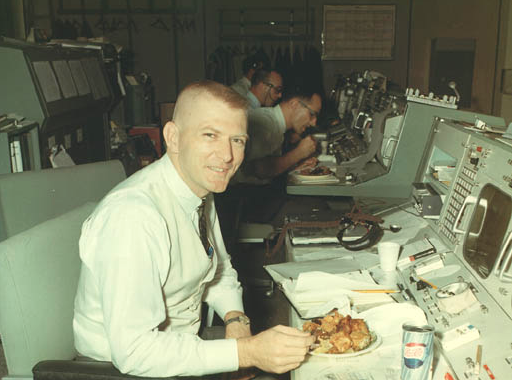
[Tweet theme=”tweet-string-underlined”]Work out your principles during moments of calm so you can refer to them quickly during times of panic. [/Tweet].
I keep a checklist for everything I require for a full show, which covers everything from plastic grocery bags to a marshmallow. Because I know my checklist is comprehensive – created as it was during a period of reflection – it frees my mind to focus on more important things before the show like the specific needs of my client.
Consider the amateur actor who invests so much time “identifying with the character” and “investing emotionally” in the script only to walk onstage only to realize that he hasn’t memorized his lines.
Recently I got to thinking about Gene Krantz, the legendary vest-clad flight director of NASA’s Apollo space program. What a high-pressure job I thought. Imagine being the sole person responsible for green lighting a launch of human beings into space.
But then I got to thinking: Wait a minute: this guy has numerous others in charge of every conceivable aspect of the mission. Responsibility is broken down into incredible detail. Krantz’ job was basically ensuring that the vote is unanimous. He’s just a straw counter!
There’s the guy in charge of the rocket’s hydraulics. The mainframe computer. Even the lowly flight surgeon is on hand to monitor the astronauts’ heart rate. What does that leave for Krantz? Nothing other than the awesome responsibility of saying “You’re go for launch, Apollo”. Put me in a vest and I could do that job.
“Ah!” I hear you say. “But what about when something goes wrong like on Apollo 13?” Are you kidding me? That’s the easiest press conference in the world: you simply gesture to the guy in charge of that aspect of the mission that went to pot and say “Look – he said we were good to go. Now you’ll excuse me – I’m going to get quietly hammered.”
Return to daviddeeble.com or learn about my laugh-out-loud corporate presentation Winning With A Bad Hand.




